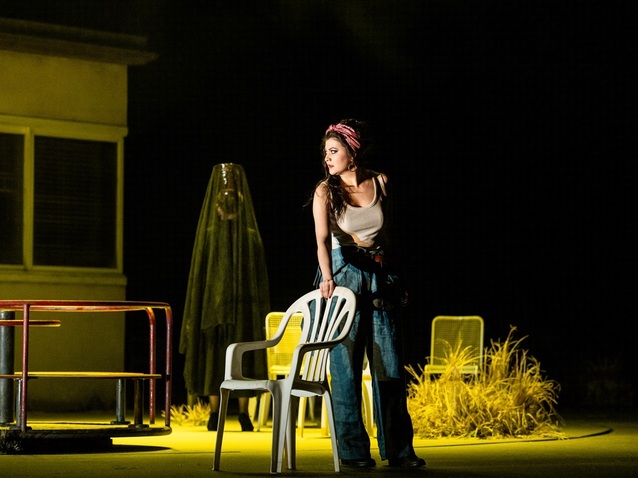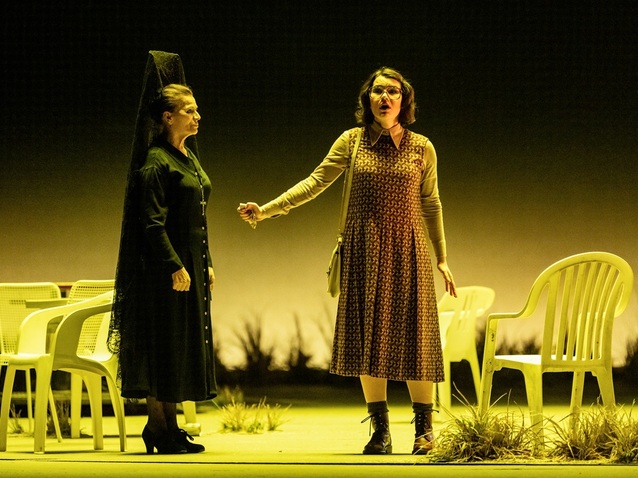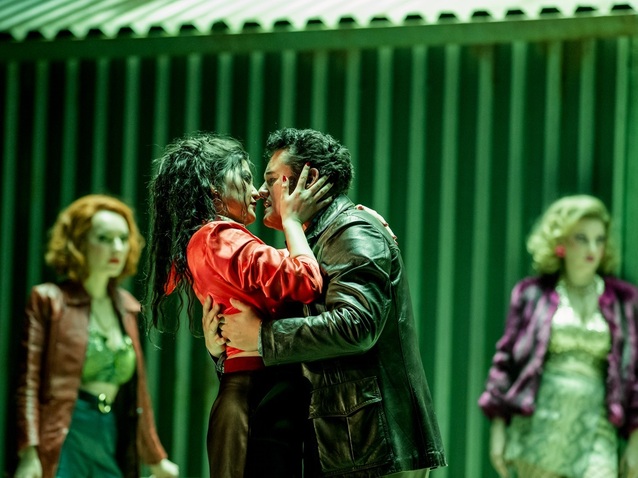 © Camilla Greenwell / ROH
© Camilla Greenwell / ROH
Based on Prosper Mérimée’s eponymous novella, Georges Bizet’s Carmen of 1875 is the story of the ultimate temptress. A gypsy and cigarette factory worker in Seville, Carmen has the power to entice any man she chooses. Once, however, they are besotted with her she quickly moves on, leaving them heart broken and unable to accept what has happened.
In the opera Don José, an army corporal, has almost everything he could ever desire. He has the sweet, loving Micaëla who is more than willing to marry him, the blessing of his mother, a job he is proud of and the opportunity to see his home village. When Carmen decides that she likes him, however, he ends up sacrificing everything he has for her, and cannot accept it when she loses interest in him and turns to the torero, Escamillo.
If Carmen hardly sounds a sympathetic character, she can certainly engage an audience with her allure and steadfast determination to live by her own rules. Freedom is the most important thing to her so that when Don José threatens to kill her unless she says that she loves him, she accepts her fate, preferring death to proclaiming a lie and feeling a sense of imprisonment.

Aigul Akhmetshina (Carmen) ROH Carmen © 2024 Camilla Greenwell
Damiano Michieletto’s new offering for the Royal Opera, which represents a co-production with Madrid’s Teatro Real and La Scala in Milan, is set in the 1970s. By moving the action forward to a relatively recent time, he aims to make the story relatable without destroying the notion of a traditional, close knit community. He also ensures, with designer Paolo Fantin, that each set comprises a large open space and a smaller one so that Act I, for example, features an enclosed police station within a larger town square. All of this is fine as far as it goes, but considering Michieletto’s self-professed aim is to be as specific as possible, the open spaces look quite generic as Act I is not the only place to feature tufts of grass.
There are also times when the action is spread across the interior and exterior spaces in ways that do not aid the coherence. This is especially noticeable in ‘Votre toast, je peux vous le rendre’ and ‘Quant au douanier, c'est notre affaire!’ when the soloists occupy the relevant interior and the chorus feel very detached outside. This is a shame because both the individuals and the group sound good, but the overall effect is marred by the latter not playing a more central role. Similarly, while it is possible to perform ‘Les tringles des sistres tintaient’ with just four people, since only three are required to sing, it is hard for the gypsy song to have the same impact without a sense of mass activity that the chorus can provide.

Ruth Alfie Admas (Mother of Don José), Olga Kulchynska (Micaëla), ROH Carmen © 2024 Camilla Greenwell
The main difficulty with the production, however, is Michieletto’s thesis, which suggests that when Don José is torn between his traditional small village life and Carmen, it is the draw of his mother and Micaëla that represents his immature side by showing his yearning for security and childish things. Surely, it is him surrendering everything that he has, or could feasibly have, in pursuit of a relationship that will obviously not last that reveals his immaturity and recklessness. Carmen is, of course, open to multiple interpretations, but Michieletto’s take suggests that were it not for his mother and Micaëla, Don José might live happily ever after with Carmen, when one could remove those two people from the equation and Carmen’s weariness with Don José by Act III would be completely unchanged.
Michieletto’s overall interpretation affects many aspects of the production. The director suggests that ‘Every time he could be free, every time there could be a happy end, Micaëla arrives to interrupt it’, but it seems odd to turn Micaëla into a disrupting force when she is hardly responsible for Carmen growing tired of Don José, and is actually trying to rescue him from the desperate situation in which he has put himself. The mother becomes a figure of death who on occasions roams the stage with varying degrees of success. When Carmen deals the card signifying death in Act III she is an effective witness to it instead of the gypsy’s friends Frasquita and Mercédès, but on other occasions her presence feels bizarre by suggesting that this normally unseen character is such a great villain in the story. She is undoubtedly important to it and may well be demanding as a person, but overall she and Micaëla are a way out for Don José from his difficulties, and not the cause of them.
The moment that seems the most out of balance is the end of Act III when Carmen here appears mortified at Don José’s departure to see his dying mother, when all of the evidence suggests she is glad to see the back of one with whom she has grown bored. Michieletto seems to place too much emphasis on Carmen’s earlier complaints that Don José is too ready to run back to his responsibilities rather than love her whole-heartedly, without considering such assertions in the context of her character as a whole. He is certainly right to emphasise that Carmen is a complex and multi-faceted individual, with her own needs and vulnerabilities, who ultimately suffers a terrible fate at the hands of a controlling, or rather out of control, man. However, when he asserts ‘When Micaëla tells José that his mother is dying, he could have elected to tell Carmen he will return; or he could even have taken her with him’ he implies that everything would be solved if only Don José would commit completely to Carmen. This seems to be at odds with what we see, which is a man who is already too committed to the gypsy and who increasingly finds that his love is not reciprocated.

Piotr Beczala (Don José), Aigul Akhmetshina (Carmen), ROH Carmen © 2024 Camilla Greenwell
Amidst a cast that is strong all round, Aigul Akhmetshina stands out in the title role. She played the same part as a Jette Parker Young Artist in 2017 in La tragédie de Carmen (Peter Brook’s 1981 take on the opera), performed it earlier this year at the Metropolitan Opera, and is also set to play it at Glyndebourne in the summer. Her mezzo-soprano is rich, sumptuous and brilliantly controlled, and she captures Carmen’s persona perfectly. As she sings ‘Tralalalala’ she is a relatively still presence, but the allure she radiates is tangible and one can positively feel her defiance, tinged as it is with just a hint of aggression. Kostas Smoriginas is also an outstanding Escamillo, as he asserts his secure bass-baritone and considerable stage presence to tremendous effect.
Piotr Beczała is in fine voice as Don José, and his performance of ‘La fleur que tu m'avais jetée’ is especially moving. However, the requirement for him to see Carmen and Micaëla in such a different way to usual affects how he develops his relationship with these characters, and impacts on the chemistry he succeeds in establishing with each. Similarly, Olga Kulchynska produces a very clear, precise and pleasing sound as Micaëla, but the unhelpful emphasis that the production places on her as a disruptor makes it harder for us to believe in her character, because it does not feel as if it adds up. Sarah Dufresne and Gabrielė Kupšytė provide excellent support as Frasquita and Mercédès, and the evening’s strong musical credentials also extend to Antonello Manacorda’s conducting. In the Overture he effectively captures the smoothness, sweep and punch that are inherent in the score, and if not all of these elements are in evidence continuously throughout the evening, the levels of precision and balance that he does achieve mean that overall there is much to enjoy. This production will be broadcast live to selected cinemas around the world on 1 May, with some venues also showing encore screenings on subsequent days. The performances from 12 May onwards will feature a different cast, which includes Vasilisa Berzhanskaya as Carmen, Brandon Jovanovich as Don José, Andrii Kymach as Escamillo and Gemma Summerfield as Micaëla. Emmanuel Villaume also takes over conducting duties from Manacorda.
By Sam Smith
Carmen | 5 April - 31 May 2024 | Royal Opera House, Covent Garden
the 10 of April, 2024 | Print
Comments